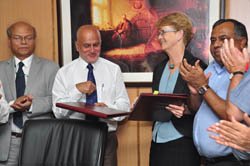Bioversity International and ICAR partner to conserve agriculture biodiversity
August 19, 2013 | Monday | News | By BioSpectrum Bureau
Bioversity International and ICAR partner to conserve agriculture biodiversity
(2nd from L) Dr S Ayyappan, secretary, Department of Agricultural Research and Education (DARE) and director general, Indian Council of Agricultural Research (ICAR)
Bioversity International and the Indian Council of Agricultural Research (ICAR) have signed an agreement today to improve agricultural sustainability, smallholder wellbeing and resilience to climate change in India through the use and conservation of agricultural biodiversity. Bioversity International will work with ICAR and other partners to implement a five-year work plan focusing on research collaboration and training through 2016.
Dr S Ayyappan, secretary, Department of Agricultural Research and Education (DARE) and Director General, Indian Council of Agricultural Research (ICAR) affirmed that ICAR will provide all necessary support to Bioversity International for the implementation of all activities as agreed in the work plan to strengthen the strong Indian programme on plant genetic resources for the benefit of global communities, following a long tradition of partnership.
"ICAR and Bioversity have worked together successfully for many years. This collaboration is continuing and leading to new activities. To respond to the challenges that farmers will face in the future, our longstanding work together is being enhanced with conservation on farms and in the wild. This approach allows biodiversity to be adaptable and can improve incomes by creating markets for diverse products" said M. Ann Tutwiler, director general of Bioversity International.
ICAR and Bioversity initiated a capacity building programme of scientists from developing countries in the field of in vitro and cryopreservation and have trained more than 100 scientists from 19 countries. Both partners are now planning to further expand this training programme to African partners so that more scientists can be trained. Knowledge of this technique is essential for the conservation of plant species which cannot be conserved through seed.
Bioversity and ICAR will work together to:
undertake collaborative research in agricultural biodiversity use and conservation,
conduct national, regional and global training courses in India on agricultural biodiversity with partners and farmers,
organize workshops, conference and meetings to advance biodiversity,
exchange visits of scientists from India to other countries and from other countries to India for enhancing skills in the field of plant genetic resources,
provide technical advice to national programs in other countries,
produce publications and exchange scientific information in the field of plant genetic resources, and
help facilitate exchange of plant genetic resources for food and agriculture as part of the International Treaty on Plant Genetic Resources for Food and Agriculture.
As part of the agreement, both parties will build on current collaborations and develop new research initiatives together. Ongoing research activities include:
Conservation and sustainable use of cultivated and wild tropical fruit diversity focusing on three commercially important tropical fruit species in India: Citrus (Citrus spp.), mango (Mangifera indica), and Mangosteen (Garcinia mangostana);
Reinforcing the resilience of poor rural communities in the face of food insecurity, poverty and climate change through on-farm conservation of local agro biodiversity;
Supporting a farmers' field network in the Indo-Gangetic Plains (IGP) region that Bioversity and ICAR helped to establish. Farmers in the districts of Punjab, Haryana, Uttar Pradesh and Bihar have participated in rice and wheat trials that began in late 2010;
Genebank efforts including research to enhance Indian farmer's adaptation to climate change using plant genetic resources; cryopreservation of global banana accessions; strengthening of the International Coconut Genebank for South Asia, and further development of plant genetic resources collections.









